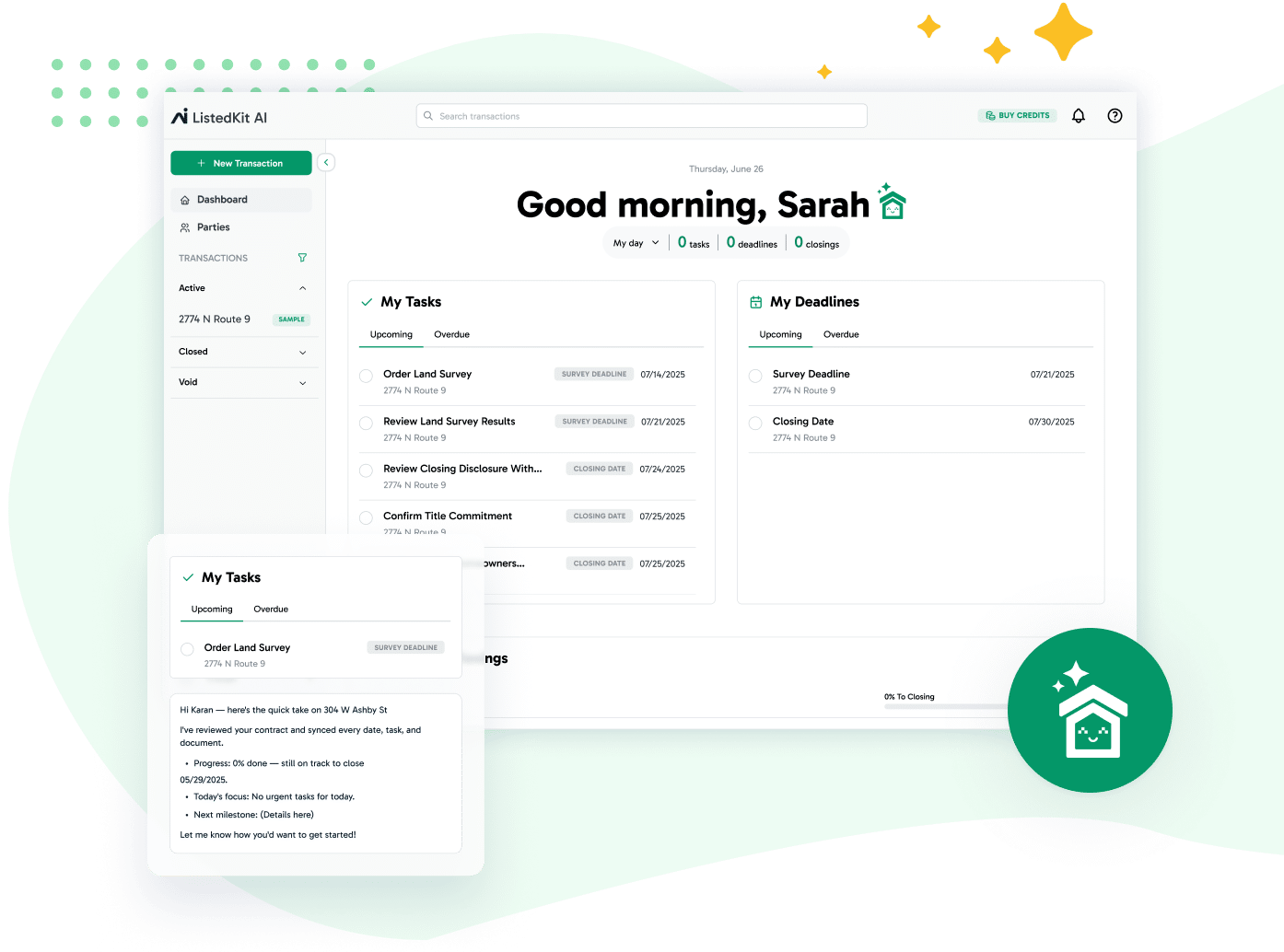To wow your clients and create an exceptional experience during real estate transactions, you must embrace seamless collaboration with the agents you support. As an independent transaction coordinator (TC), your ability to handle the intricate details of real estate transactions is already a major asset to agents and their clients.
But if you build trust with agents by keeping them informed of changes and even anticipating problems, the process can be much smoother and more secure. This article looks at some strategies to enhance your relationships with agents, improve your communication skills, and provide that regular service that real estate professionals will be grateful for and remember.
Establish Effective Channels of Communication
Smoother communication is always the key to effective and harmonious collaboration between an independent transaction coordinator and real estate agents. The transaction process will be faster and more efficient whenever the communication goes smoothly, reducing errors and avoiding delays.
For instance, if one is working for a busy agent dealing in several real estate transactions, relying upon one’s skills to keep up with deadlines, inspections, and a whole host of documents, there is a great deal of room for potential pitfalls if communication isn’t clear. You can head those missteps off at the pass and help your agent stay on top by establishing a solid communication procedure for regular updates.
Start with Aligned Expectations
Setting expectations from the outset means that you and the agent clearly know each other’s roles and responsibilities throughout the transaction process.
- Clearly stipulate the division of administrative tasks, including document management and customer communication.
- Agree upon the best form of communication—email, task tracking via online platforms, or scheduled calls.
- Review all critical dates, such as inspection periods and escrow instructions, to avoid last-minute surprises.
This alignment thus creates a proper ground for successful transactions and ensures smoother collaboration.
Keep Communication Consistent
Regular updates build trust and ensure no detail goes unnoticed in the transaction.
- Schedule weekly or bi-weekly check-ins to review transaction details, address outstanding items, and confirm progress.
- Use brief updates to summarize all the work accomplished, outstanding obligations, and any non-compliance risks.
- Leverage task tracking tools for transparency; allow the agent to access real-time updates, refraining from constant back-and-forth communication.
Smooth communication lessens stress for all parties involved and helps establish a collaborative-competitive relationship in the real estate world.
Address Challenges Without Delay
Even with careful planning, complications can arise in the transaction process. The quicker these problems are resolved, the better the ability to uphold client satisfaction.
- Set up a system to flag urgent factors, such as missing electronic signatures or legal requirements.
- Immediately bring to the agent’s attention possible roadblocks and collaborate on finding solutions.
- Be proactive: take care of possible risks before they become huge problems.
For instance, if an issue occurs with the issuance of an inspection report, the sooner the agent is notified, the better the modification of timelines will be to retain clients’ peace of mind.
Share Expertise to Strengthen Collaboration
A skilled transaction coordinator brings expertise that can complement an agent’s focus on client relationships and closing deals. You can improve workflows and strengthen professional relationships by sharing knowledge and gaining insights from agents.
Educating Agents on TC Processes
Many agents may not fully understand the legalities and administrative aspects managed by TCs. Educating them about your work can prevent miscommunication and enhance their confidence in your role.
- Provide a clear overview of your responsibilities, such as managing compliance risks, tracking critical deadlines, and organizing transaction-related documents.
- Highlight how your expertise in customizable workflows and digital transaction management allows agents to focus on their primary role: building client relationships.
- Explain how your work ensures compliance with real estate regulations and federal standards, reducing the risk of delays.
Incorporating Agent Insights
Agents often have valuable insights about client preferences or potential hurdles in the transaction. Incorporating this knowledge can help you adapt your processes for a seamless experience.
- Ask agents to share personal preferences or specific details about their clients that could influence timelines or communication styles.
- Use this input to address unique challenges like navigating tight deadlines or meeting specific client expectations.
- Reinforce how agent collaboration creates a more tailored and efficient process for all parties.
For instance, if an agent informs you that a client prefers detailed updates, you can customize your communication approach to align with their expectations.
Hosting Knowledge-Sharing Sessions
Short, focused workshops can help agents better understand the role of TCs while creating opportunities for mutual learning.
- Demonstrate how you use innovative tools for transaction management to streamline operational tasks.
- Provide agents with scripts or talking points to introduce you as a dedicated coordinator to their clients.
- Share practical tips for agents to help improve efficiency, such as timely submission of transaction details.
Such sessions can improve collaboration and highlight the power of working together for successful closings.
Coordinate a Unified Client Experience
Clients feel supported and confident when agents and TCs present a cohesive and organized front. Aligning communication and workflows ensures an exceptional customer service experience that reflects professionalism and builds trust.
Delivering Consistent Messaging
Clients expect clear and unified updates from their real estate team. Inconsistent communication can lead to confusion, so it’s important to coordinate messaging effectively.
- Use shared calendars or task-tracking tools to synchronize timelines and avoid conflicting information about closing dates or escrow on time.
- Agree on key points to share with clients, ensuring that updates are accurate and aligned between you and the agent.
- Coordinate responses to challenges, presenting solutions collaboratively to maintain client confidence.
This approach avoids communication issues and ensures clients feel informed throughout the transaction process.
Personalizing Client Interactions
A personalized approach enhances the experience for clients, showing that their needs and preferences are a priority.
- Tailor updates the client’s preferred communication style, whether they prefer detailed emails or quick phone calls.
- Celebrate milestones, like contract approvals or completed inspections, with thoughtful messages or congratulations.
- Anticipate client concerns and address them proactively with timely updates.
For instance, sending a congratulatory email after a client’s offer is accepted demonstrates attentiveness and strengthens their trust.
Collaborative Problem-Solving
When challenges arise, working together as a team reassures clients that their transactions are in capable hands.
- Discuss potential issues with the agent before informing the client, ensuring you agree on the solution.
- Divide responsibilities based on your respective strengths, addressing problems efficiently.
- Present solutions clearly to the client, showing that you and the agent are aligned and proactive.
This unified problem-solving approach minimizes stress and enhances the experience for clients.
Use Online Tools to Simplify the Process
Digital tools can also be your and your agents’ partners, streamlining workflows and making collaboration more efficient. Integrating transaction management software, document storage platforms, and automation tools into your process can save time, reduce errors, and improve the client experience.
These technologies support seamless communication and ensure everyone stays on the same page, making the entire transaction process smoother.
Centralizing Information on Digital Platforms
Centralized platforms provide a shared workspace for agents and TCs, allowing for better coordination and transparency.
- Use transaction management software to consolidate all transaction-related documents and deadlines in one accessible location.
- Share task lists and updates in real-time to keep everyone informed about progress and outstanding responsibilities.
- Standardize communication and workflows within the platform to reduce errors and ensure consistency.
For instance, a centralized system allows you and the agent to track critical milestones like inspection periods or document submissions without manually confirming details.
Automating Routine Tasks
Automation reduces the manual workload, allowing you to focus on more strategic aspects of the transaction process.
- To keep everything on schedule, set up automatic reminders for deadlines, such as escrow payments or document signings.
- Use email templates for recurring client updates, ensuring consistency and saving time.
- Implement automated task trackers that notify relevant parties of their next steps, improving efficiency and accountability.
If, for example, your system automatically alerts the agent when an inspection deadline is approaching, you eliminate the risk of forgetting an important task while reducing the need for manual follow-ups.
Refining Collaboration Through Performance Reviews
Regular reviews of completed transactions can help identify opportunities to enhance your collaboration with agents and improve your processes.
- Analyze any recurring challenges, such as delays in document submissions or unclear task ownership, and brainstorm solutions together.
- Use insights from past transactions to fine-tune workflows, communication strategies, or technology usage.
For instance, if you and an agent notice frequent last-minute scrambles for signatures, you can adjust your timeline management process to account for earlier follow-ups, reducing stress and improving efficiency in future deals.
Build a Partnership Mindset
The issue of why some agent-TC relationships don’t work is the lack of a true partnership mindset. When agents and transaction coordinators (TCs) operate in silos or fail to recognize each other’s contributions, it can lead to miscommunication, inefficiencies, and unmet expectations. A successful agent-TC collaboration requires mutual respect, shared goals, and a commitment to working together to deliver the best results for clients. Building this type of partnership ensures smoother transactions and a more productive working relationship for both parties.
Recognizing Contributions
Mutual acknowledgement of each other’s value is essential to creating a strong working relationship.
- Appreciate the agent’s efforts in maintaining client relationships and driving deals forward, even in high-pressure situations.
- Highlight the impact of your work in managing the administrative and compliance aspects, which ensures transactions stay on track.
- Share how your respective roles complement each other, with both contributing to successful outcomes.
For example, when an agent takes the time to thank you for staying on top of deadlines, it reinforces the partnership and strengthens your working dynamic.
Conducting Transaction Debriefs
Regular debriefs after a transaction offers a structured opportunity to reflect and improve.
- Discuss what aspects of the process were smooth and identify areas where changes could enhance efficiency or reduce delays.
- Address specific challenges that arose, such as communication gaps or delayed tasks, and brainstorm actionable solutions.
- Use these conversations to establish best practices that improve future transactions and strengthen the partnership.
For instance, if you and an agent identify that inconsistent document submissions caused delays, agreeing on a standardized system can help avoid similar problems in future deals.
Maintaining Regular Communication
Consistent communication, even outside of active transactions, helps sustain the partnership and keep both parties aligned.
- Schedule regular check-ins to share updates on workflows, tools, or upcoming transactions, ensuring ongoing collaboration.
- Use these meetings to address concerns or potential improvements proactively rather than waiting for issues to arise.
- Treat communication as an ongoing opportunity to build rapport and maintain a positive relationship.
Strengthen Collaboration and Deliver Exceptional Results
Collaboration between agents and independent transaction coordinators is essential to creating smooth transactions and exceptional client experiences. This article outlined strategies to help you work effectively with agents, streamline processes, and build stronger partnerships that benefit everyone involved.
Recap of the Five Strategies:
- Establish strong communication channels by setting clear expectations, maintaining regular updates, and addressing challenges quickly to avoid delays and confusion.
- Share expertise to strengthen collaboration by educating agents on your workflows, incorporating their insights, and creating opportunities for mutual learning to improve coordination.
- Coordinate a unified client experience by aligning communication, personalizing interactions, and presenting solutions collaboratively to build trust with clients.
- Use online tools to simplify the process with centralized platforms, automated reminders, and efficient workflows that save time and reduce errors.
- Build a partnership mindset by recognizing contributions, conducting post-transaction reviews, and maintaining regular communication to foster mutual respect and long-term success.
Looking to enhance your processes and take your collaboration with agents to the next level? Subscribe to our newsletter for more expert tips and tools to improve your transaction coordination success.




